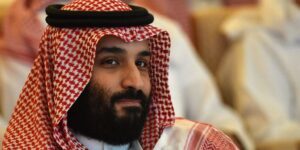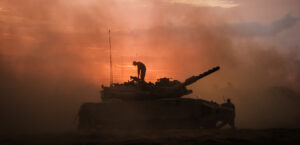Sunday’s ugly scenes at Makhachkala Airport in Russia’s Dagestan region, where a mob ran riot through the terminal and onto the runway in search of Jews disembarking from a plane from Israel, might suggest that Vladimir Putin is beginning to lose his iron grip on the Russian Federation. Videos of protesters threatening not just the public but pelting the police with missiles spread rapidly on domestic social media networks, calling to mind the chaotic violence that preceded the 1917 Revolution.
In reality, however, the Putin regime does not just tolerate but encourages violence against minorities in order to justify the state’s own wars and attempt to create a more harmonious Russian society. The Machachkala pogrom, while unplanned and perhaps even undesired, is easily rewritten to fit a narrative in which Russia is constantly under threat of invasion from the outside.
In the world of official propaganda, Russia is a flourishing “multinational” country where millions of Muslims, indigenous peoples, and even Jews live happily alongside one another under the banner of a shared Russianness. The morning after the violence in Makhachkala, Russia’s schoolchildren were treated to a mandatory patriotism lesson in preparation for the “Day of National Unity” on 4 November. Videos and slideshows produced by the state and shown in classrooms across the country depicted beaming caricatures of Russia’s national minorities living harmoniously. Such celebratory material is hardly new to Russia: the Putin regime is merely emulating Soviet-era depictions of racial harmony. In Russia, citizens are told again and again that the country is a model of peaceful ethnic integration.
Yet, perhaps contrary to expectations, the violent pogrom in Makhachkala has not been ignored by the state media, which rarely reports on political protests. As events unfolded on Sunday, major news services and state-aligned social media personalities carried updates and even shared alarming videos from the ground. If the state was worried that the contagion of unrestrained violence might reveal a deeper instability, then its anxiety was well hidden. Indeed, the state’s propaganda organs seemed to relish reporting on the grisly details of arrests made and injuries inflicted in a flood of stories over the next 24 hours.
By Monday, the state’s top political spokespeople added a new dynamic to the story. Kremlin spokesman Dmitry Peskov attributed the violence to “interference from the outside… given the circulation of footage showing the horror of Gaza — the deaths of children, seniors, medics — it’s easy for miscreants to manipulate the situation, to provoke and inflame people.” Foreign Ministry spokeswoman Maria Zakharova chipped in to name the “miscreants” as “the criminal Kiev [sic] regime”. In this reading, Russia is under attack by shadowy forces from the outside; violence within Russia must be evidence not of internal problems but of a world conspiring against the country’s multiracial harmony.
In reality, of course, it is not Russia’s opponents but the Russian state itself that has fuelled the flames of antisemitism at home. In recent years, it has introduced numerous laws targeting non-Orthodox religions. Jewish organisations have come under repeated attacks, culminating in the exile of the now-former chief rabbi of Russia, Pinchas Goldschmidt. The social media channels of major state outlets and their presenters have been accused of using antisemitic language and tropes. In September, Putin himself claimed that the Jewish president of Ukraine, Volodymyr Zelensky, was only in power to hide his country’s “glorification of Nazism”. Openly antisemitic rhetoric runs rife through official discourse while the slightest transgressions of draconian freedom of speech laws about the so-called “special military operation” or the government’s conduct can result in lengthy jail terms.
Yet the state has denied any responsibility. On 30 October, the day after the violence in Makhachkala, Putin confirmed his spokespeople’s explanation of its causes in a meeting of Russia’s Security Council: “The USA’s ruling elites and its satellite [nations] are behind the tragedy of the Palestinians and the chaos in the Middle East, the conflict in Ukraine, and many other conflicts around the world.” His hypocrisy is so brazen that it seems inexplicable. Why would a government that has so openly deployed antisemitism lay the blame for violence at the door of the opposition?
Maintaining war, not peace, is optimal for the continued justification of Putin’s arch-nationalist rule. Russia’s response to Makhachkala, according to Putin, must not take the form of internal questioning or domestic reform, but an external battle: “Russia is fighting on the battlefield [in Ukraine] for our future, for the principles of a just world order, and for the freedom of countries and nations.” To fight in Ukraine, he explained, was to decide “the future of Russia, the whole world, and even the future of the Palestinian people”. To resolve internal conflict such as antisemitic violence in Makhachkala, according to this topsy-turvy logic, requires the waging of a far larger, and potentially endless, battle against both Ukraine and the United States.
In this neo-fascist world, chaos and violence, rather than being perilous phenomena that threaten domestic stability, create the energy and unity that drive Russia’s march toward historical greatness (a point that Putin underlined by littering his speech to the Security Council with references to past conflicts). To fight, to wage war, is an essential part of Russia’s path to its historical destiny: an absurd historical formulation that means that violence is as inevitable as it is desirable.
This stance has long been a central part of political discourse under Putin. Almost two decades ago, after Islamic militants conducted a violent attack and siege on a school in Beslan, North Ossetia, he made a near-identical speech. Putin argued that, after hundreds of Russian schoolchildren were killed in large part thanks to a botched rescue effort led by Russian security forces, national unity was essential to fight a “cruel and full-scale war”— in this case, the “entire nation” had to be mobilised to wage war against Islamic separatists in Chechnya. The state’s own role in unleashing bloody violence against its own population in the region was left unexamined.
For the Putinist state, though, the cycle of war and peace is not limited to the present. In this week’s school patriotism lesson for the Day of National Unity, children learned that national unity can only be achieved through war. A central part of the lesson for every age group is to learn the story of Kuzma Minin and Dmitry Pozharsky, two militia heroes who led a revolt against Polish invaders in 1612. Russia’s children are told that, without violent struggle against forces seeking to destroy the country, both today and historically, peace is impossible. Russians must, in effect, be perpetually ready to fight as an act of self-defence — even if that means attacking other inhabitants of the country from time to time.
The state and the propaganda organs under Putin do not seek to end horrific acts like those witnessed in Makhachkala. They encourage them, for they justify the state’s consistent failures to create the harmonious society it has long promised but failed to deliver. After all, for as long as Russians witness and participate in violent chaos at home, they can be assured that external enemies are marshalling their forces against Moscow — and that the Kremlin’s latest war, whether in Chechnya, Ukraine, or elsewhere, is not just desirable but unavoidable.
Disclaimer
Some of the posts we share are controversial and we do not necessarily agree with them in the whole extend. Sometimes we agree with the content or part of it but we do not agree with the narration or language. Nevertheless we find them somehow interesting, valuable and/or informative or we share them, because we strongly believe in freedom of speech, free press and journalism. We strongly encourage you to have a critical approach to all the content, do your own research and analysis to build your own opinion.
We would be glad to have your feedback.
Source: UnHerd Read the original article here: https://unherd.com/



